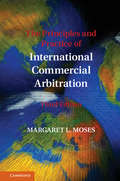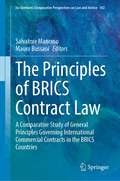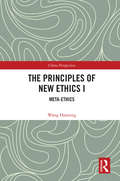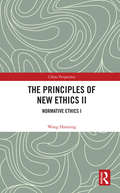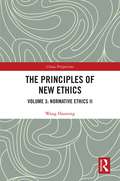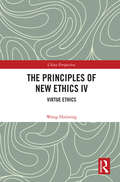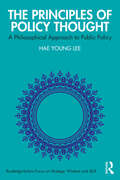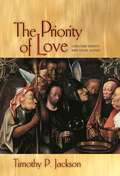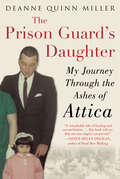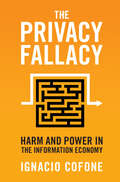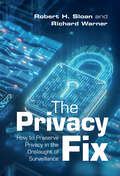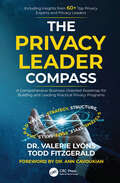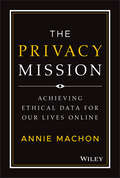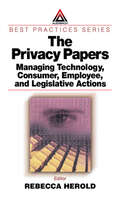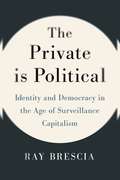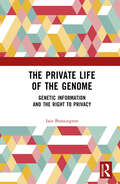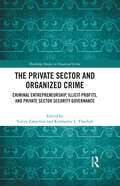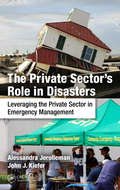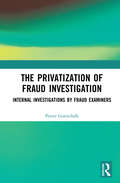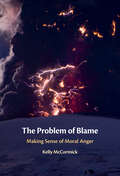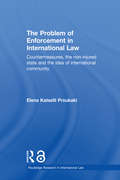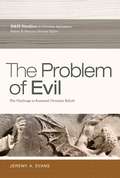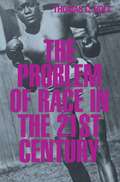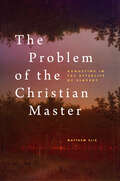- Table View
- List View
The Principles and Practice of International Commercial Arbitration: Third Edition
by Moses Margaret L.The Principles and Practice of International Commercial Arbitration provides the reader with immediate access to understanding the world of international arbitration. Arbitration has become the dispute resolution method of choice in international transactions. This book explains how and why arbitration works. It provides the legal and regulatory framework for international arbitration, as well as practical strategies to follow and pitfalls to avoid. It is short and readable, but comprehensive in its coverage of the basic requirements, including the most recent changes in arbitration laws, rules, and guidelines. The second edition includes updates on rules and guidelines, such as the arbitration rules of the ICC, the SCC, the ACICA, and UNCITRAL, as well as the 2010 IBA Rules on Taking of Evidence in International Arbitration. In the book, the author includes insights from numerous international arbitrators and counsel, who tell firsthand about their own experiences of arbitration and their views of best practices. Throughout the book, the principles of arbitration are supported and explained by the practice, providing a concrete approach to an important means of resolving disputes.
The Principles of BRICS Contract Law: A Comparative Study of General Principles Governing International Commercial Contracts in the BRICS Countries (Ius Gentium: Comparative Perspectives on Law and Justice #102)
by Mauro Bussani Salvatore MancusoThis book examines national reports on contract law in each of the BRICS countries (Brazil, Russia, India, China and South Africa) in order to provide a comparative analysis. It then establishes common principles, where possible, as well as a set of general “soft law” principles governing international commercial contracts in these countries. The importance of commercial transactions in the BRICS countries is rapidly growing, yet differences in contract law among these countries can lead to misunderstandings and disputes. The rapid development of the BRICS instruments (and the legal implications of their use) suggests the need to address common legal issues that could harm the continued development of the BRICS economies. Contract law represents one of the core areas in which this process can take place. Addressing the salient legal issues within the BRICS discourse requires a comprehensive, comparative approach that explores the different solutions provided by each member country, in order to identify similarities and convergences. This process may ultimately help to reduce the legal obstacles to, and indirect costs of, cross-border transactions by offering a transparent and predictable legal environment for any future attempt at adopting common legal instruments.
The Principles of New Ethics I: Meta-ethics (China Perspectives)
by Wang HaimingFrom Descartes to Spinoza, Western philosophers have attempted to propose an axiomatic systemization of ethics. However, without consensus on the contents and objects of ethics, the system remains incomplete. This fourvolume set presents a model that highlights a Chinese philosopher’s insights on ethics after a 22-year study. Three essential components of ethics are examined: metaethics, normative ethics, and virtue ethics. This volume mainly studies meta- ethics. The author not only studies the fi ve primitive concepts of ethics— “value,” “good,” “ought,” “right,” and “fact”— and reveals their relationship, but also demonstrates the solution to the classic “Hume’s guillotine”— whether “ought” can be derived from “fact.” His aim is to identify the methods of making excellent moral norms, leading to solutions on how to prove ethical axioms and ethical postulates. Written by a renowned philosopher, the Chinese version of this set sold more than 60,000 copies and has exerted tremendous infl uence on the academic scene in China. The English version will be an essential read for students and scholars of ethics and philosophy in general.
The Principles of New Ethics II: Normative Ethics I (China Perspectives)
by Wang HaimingFrom Descartes to Spinoza, Western philosophers have attempted to propose an axiomatic systemization of ethics. However, without consensus on the contents and objects of ethics, the system remains incomplete. This four-volume set presents a model that highlights a Chinese philosopher’s insights on ethics after a 22-year study. Three essential components of ethics are examined: metaethics, normative ethics, and virtue ethics. In this volume, the author sets out to discuss morality, and shows how the reasoning behind it can be both good and bad for human society from various perspectives. A system of an ultimate standard of morality is introduced and it is shown that where there are conflicts between different moral norms that cannot be compromised, people undoubtedly sacrifice less important moral norms to follow more fundamental and important moral norms or principles.The Chinese version of this set sold more than 60,000 copies and has exerted tremendous influence on the academic scene in the People’s Republic. The English version will be an essential read for students and scholars of ethics and philosophy in general.
The Principles of New Ethics III: Normative Ethics II (China Perspectives)
by Wang HaimingFrom Descartes to Spinoza, Western philosophers have attempted to propose an axiomatic systemization of ethics. However, without consensus on the contents and objects of ethics, the system remains incomplete. This four-volume set presents a model that highlights a Chinese philosopher’s insights on ethics after a 22 year study. Three essential components of ethics are examined: metaethics, normative ethics, and virtue ethics. This volume is the second part of the discussion on normative ethics. The author analyzes humanity, liberty, justice, happiness, and systems of moral rules. He puts forward 26 value standards that construct a system of measuring state instruction; reveals the relationship between humanity, liberty and justice; puts forward three objective laws of happiness; and discusses the goodness of important moral rules, such as honesty, self-respect and courage. This set is an essential read for students and scholars of ethics and philosophy in general.
The Principles of New Ethics IV: Virtue Ethics (China Perspectives)
by Wang HaimingFrom Descartes to Spinoza, Western philosophers have attempted to propose an axiomatic systemization of ethics. However, without consensus on the contents and objects of ethics, the system remains incomplete. This four-volume set presents a model that highlights a Chinese philosopher’s insights on ethics after a 22-year study. Three essential components of ethics are examined: metaethics, normative ethics, and virtue ethics. In this volume, the author analyzes the relationship between people’s sense of reputation, the political and economic status of a nation, and the observation of virtue ethics and he argues that reputation can encourage people to conform to virtue ethics. In addition, a nation’s political and economic status is closely connected to people’s virtue ethics. That is, people will have higher virtue ethics when constitutional democracy, a market economy without government control, freedom of speech, and the moral system of liberalism and egalitarianism are established in a nation. This title is an essential read for students and scholars of ethics and philosophy in general.
The Principles of Policy Thought: A Philosophical Approach to Public Policy (Routledge-Solaris Focus on Strategy, Wisdom and Skill)
by Hae Young LeePolicy thought integrates the “why” of political philosophy and the “how” of public policy formulation. Lee outlines five key principles for the development of policy thought:• The Principle of Policy Statism• The Principle of Policy Goodness• The Principle of Policy Balance• The Principle of Policy Practicality• The Principle of Policy Humans: Interpenetrated Policy Humans with Non-humans Each principle is derived from a combination of Confucian and other East Asian philosophies, as well as contemporary Western political philosophy. In combination they offer an innovative approach to formulating, configuring and assessing public policy, with ethics and efficacy. An essential guide to incorporating big picture philosophical questions into pragmatic policy for students, practitioners and scholars of public policy and administration.
The Priority of Love: Christian Charity and Social Justice (New Forum Books #57)
by Timothy P. JacksonThis book explores the relation between agape (or Christian charity) and social justice. Timothy Jackson defines agape as the central virtue in Christian ethical thought and action and applies his insights to three concrete issues: political violence, forgiveness, and abortion. Taking his primary cue from the New Testament while drawing extensively from contemporary theology and philosophy, Jackson identifies three features of Christian charity: unconditional commitment to the good of others, equal regard for others' well-being, and passionate service open to self-sacrifice for the sake of others.Charity, prescribed by Jesus for his disciples and named by Saint Paul as the "greatest" theological virtue, is contrasted with various accounts of justice. Jackson argues that agape is not trumped by justice or other goods. Rather, agape precedes justice: without the work of love, society would not produce persons capable of merit, demerit, and contract, the elements of most modern conceptions of justice. Jackson then considers the implications of his ideas for several questions: the nature of God, the relation between Christian love and political violence, the place of forgiveness, and the morality of abortion. Arguing that agapic love is to be construed as a gift of grace as well as a divine commandment, Jackson concludes that love is the "eternal life" that makes temporal existence possible and thus the "first" Christian virtue. Though foremost a contribution to Christian ethics, Jackson's arguments and the issues he takes up will find a broader readership.
The Prison Guard's Daughter: My Journey Through the Ashes of Attica
by Deanne Quinn MillerIn this moving memoir, a woman recounts her search for truth and justice regarding her father’s murder during America’s deadliest prison riot.Deanne Quinn Miller was five years old when her father—William “Billy” Quinn—was murdered in the first minutes of the Attica Prison Riot, the only corrections officer to die at the hands of inmates. But how did he die? Who were the killers? Those questions haunted Dee and wreaked havoc on her psyche for thirty years. Finally, when she joined the Forgotten Victims of Attica, she began to find answers. This began the process of bringing closure not only for herself but for the other victims’ families, the former prisoners she met, and all of those who perished on September 13, 1971—the day of the “retaking,” when New York State troopers and corrections officers at the Attica Correctional facility slaughtered twenty-nine rioting prisoners and ten hostages in a hail of gunfire.In The Prison Guard’s Daughter, Dee brings readers in on her lifelong mission for the truth and justice for the Attica survivors and the families of the men who lost their lives. But the real win was the journey that crossed racial and criminal-justice divides: befriending infamous Attica prisoner Frank “Big Black” Smith, meeting Richard Clark and other inmates who tried to carry her father to safety after his beating, and learning what life was like for all the people—prisoners and prison employees alike—inside Attica. As Miller lays bare the truth about her father’s death, the world inside Attica, and the state’s reckless raid and coverup, she conveys a narrative of compassionate humanity and a call for prison reform.Praise for The Prison Guard’s Daughter“A remarkable tale of healing and reconciliation, born from the tragedy of the nation’s deadliest prison uprising . . . . The Prison Guard’s Daughter reminds us that we can reach across divides—racial, social, economic—and learn lessons about others that inevitably teach us about ourselves. In a world in which the chasms among people seem to swell wider every day, this book tells us that our true angels can prevail, as long as we are ready to engage them.” —Sister Helen Prejean, author of Dead Man Walking: The Eyewitness Account of the Death Penalty That Sparked a National Debate“In the wake of the unimaginable trauma caused by the State of New York, there were the courageous few who had to endure even more pain to make sure that there was some reckoning with this horrific event, and some measure of justice for its victims. This is the extraordinarily beautiful story of one of the most courageous of those few, Dee Quinn Miller, who, quite literally, changed history.” —Heather Ann Thompson, Pulitzer Prize–winning author of Blood in the Water: The Attica Prison Uprising of 1971 and its Legacy“A personal, affecting, and eye-opening account of a pivotal tragedy on the seemingly endless road to prison reform.” —Booklist
The Privacy Fix: How to Preserve Privacy in the Onslaught of Surveillance
by Richard Warner Robert H. SloanOnline surveillance of our behavior by private companies is on the increase, particularly through the Internet of Things and the increasing use of algorithmic decision-making. This troubling trend undermines privacy and increasingly threatens our ability to control how information about us is shared and used. Written by a computer scientist and a legal scholar, The Privacy Fix proposes a set of evidence-based, practical solutions that will help solve this problem. Requiring no technical or legal expertise, the book explains complicated concepts in clear, straightforward language. Bridging the gap between computer scientists, economists, lawyers, and public policy makers, this book provides theoretically and practically sound public policy guidance about how to preserve privacy in the onslaught of surveillance. It emphasizes the need to make tradeoffs among the complex concerns that arise, and it outlines a practical norm-creation process to do so.
The Privacy Leader Compass: A Comprehensive Business-Oriented Roadmap for Building and Leading Practical Privacy Programs
by Todd Fitzgerald Valerie LyonsCongratulations! Perhaps you have been appointed as the Chief Privacy Officer (CPO) or the Data Protection Officer (DPO) for your company. Or maybe you are an experienced CPO/DPO, and you wonder – "what can I learn from other successful privacy experts to be even more effective?" Or perhaps you are considering a move from a different career path and deciding if this is the right direction for you. Seasoned award-winning Privacy and Cybersecurity leaders Dr. Valerie Lyons (Dublin, Ireland) and Todd Fitzgerald (Chicago, IL USA) have teamed up with over 60 award-winning CPOs, DPOs, highly respected privacy/data protection leaders, data protection authorities, and privacy standard setters who have fought the tough battle. Just as the #1 best-selling and CANON Cybersecurity Hall of Fame winning CISO Compass: Navigating Cybersecurity Leadership Challenges with Insights from Pioneers book provided actionable advice to Chief Information Security Officers, The Privacy Leader Compass is about straight talk – delivering a comprehensive privacy roadmap applied to, and organized by, a time-tested organizational effectiveness model (the McKinsey 7-S Framework) with practical, insightful stories and lessons learned. You own your continued success as a privacy leader. If you want a roadmap to build, lead, and sustain a program respected and supported by your board, management, organization, and peers, this book is for you.
The Privacy Mission: Achieving Ethical Data for Our Lives Online
by Annie MachonFuture-proof yourself and your organization against known threats to privacy and online safety The subject of data ethics has never been more urgent. This is no longer an academic or niche geek issue as it has been since the inception of the internet and the world wide web. Data ethics is an issue that affects all of us now as our personal and professional lives increasingly take place online. Who controls access to the hardware, who runs the software, who can spy on us, hack us, data farm us? What are the threats that we need to mitigate against democratically, societally, and personally? How can corporations protect us and how can that help their bottom line?The Privacy Mission aims to answer these questions and summarise both the overarching concepts and principles about why data ethics is important. It offers practical solutions for companies, policy makers and individuals to push back against known threats and future proof themselves going forward.
The Privacy Papers: Managing Technology, Consumer, Employee and Legislative Actions (ISSN)
by Rebecca HeroldToday, more than ever, organizations have to cope with increased concerns regarding privacy issues. These concerns are not limited to consumer fears about how information collected by Web sites will be used or misused. They also involve broader issues, including data collected for direct response marketing, privacy of financial and health records,
The Private Is Political: Identity and Democracy in the Age of Surveillance Capitalism
by Ray BresciaExposes the threats to our personal and political identity in the age of surveillanceIt has become alarmingly clear that our online actions are less private than we’re led to believe. Our data is routinely sold and shared with companies who want to sell us something, political actors who want to analyze our behavior, and law enforcement who seek to limit our actions.The Private is Political explores the failure of existing legal systems and institutions to protect our online presence and identities. Examining the ways in which the digital space is under threat from both governments and private actors, Ray Brescia reveals how the rise of private surveillance prevents individuals from organizing with others who might help to catalyze change in their lives. Brescia argues that we are not far from a world where surveillance chills not just our speech, but our very identities. This will ultimately stifle our ability to live full lives, realize democracy, and even shape the laws that affect our privacy itself.Beyond merely identifying the harms to individuals from privacy violations, Brescia furthers our understanding of privacy by identifying and naming political privacy and the integrity of identity as central to democracy. The Private is Political empowers consumers by outlining a roadmap for a comprehensive privacy regime, leveraging various institutions to collectively safeguard privacy rights.
The Private Life of the Genome: Genetic Information and the Right to Privacy
by Iain BrassingtonThis innovative and engaging book argues that because our genetic information is directly linked to the genetic information of others, it is impossible to assert a ‘right to privacy’ in the same way that we can in other areas of life. This position throws up questions around access to sensitive data. It suggests that we may have to abandon certain intuitions about who may access our genetic information; and it raises concerns about discrimination against people with certain genetic characteristics. But the author asserts that regulating access to genetic information requires a more nuanced perspective that does not rely on the familiar language of rights. The book proposes new ways in which we may think about who has access to what genetic information, and on what basis they do so. Conceptually challenging, the book will prove engaging reading for scholars and students interested in the area of bioethics and medical law, as well as policy makers working with these pressing issues.
The Private Sector and Organized Crime: Criminal Entrepreneurship, Illicit Profits, and Private Sector Security Governance (Routledge Studies in Organised Crime)
by Yuliya ZabyelinaThis book contributes to the literature on organized crime by providing a detailed account of the various nuances of what happens when criminal organizations misuse or penetrate legitimate businesses. It advances the existing scholarship on attacks, infiltration, and capture of legal businesses by organized crime and sheds light on the important role the private sector can play to fight back. It considers a range of industries from bars and restaurants to labour-intensive enterprises such as construction and waste management, to sectors susceptible to illicit activities including transportation, wholesale and retail trade, and businesses controlled by fragmented legislation such as gambling. Organized criminal groups capitalize on legitimate businesses beleaguered by economic downturns, government regulations, natural disasters, societal conflict, and the COVID-19 pandemic. To survive, some private companies have even become the willing partners of criminal organizations. Thus, the relationships between licit businesses and organized crime are highly varied and can range from victimization of businesses to willing collusion and even exploitation of organized crime by the private sector – albeit with arrangements that typically allow plausible deniability. In other words, these relationships are highly diverse and create a complex reality which is the focus of the articles presented here. This book will appeal to students, academics, and policy practitioners with an interest in organized crime. It will also provide important supplementary reading for undergraduate and graduate courses on topics such as transnational security issues, transnational organized crime, international criminal justice, criminal finance, non-state actors, international affairs, comparative politics, and economics and business courses.
The Private Sector's Role in Disasters: Leveraging the Private Sector in Emergency Management
by Alessandra Jerolleman John J. KieferThis book examines the role of the private sector in emergency management and how that role is changing through private sector intersections with government, government agencies, and the public sectors in all phases of emergency management. It particularly focuses on the areas in which government regulations and guidelines promote or encourage priv
The Private Sector's Role in Disasters: Leveraging the Private Sector in Emergency Management
by Alessandra Jerolleman John J. KieferThis book examines the role of the private sector in emergency management and how that role is changing through private sector intersections with government, government agencies, and the public sectors in all phases of emergency management. It particularly focuses on the areas in which government regulations and guidelines promote or encourage priv
The Privatization of Fraud Investigation: Internal Investigations by Fraud Examiners
by Petter GottschalkThis book discusses privatization of law enforcement in relation to suspected corporate crime and recommends guidelines for successful fraud examinations. There is a growing business for global auditing and local law firms to conduct internal investigations at client organizations when there is suspicion of white-collar misconduct and crime. This book reflects on the work by these private fraud examiners in terms of an evaluation of their investigation reports. The book brings an original theoretical and methodological approach to investigations of white-collar crime. It develops the theory of convenience as an explanation for motive, opportunity, and willingness to commit and conceal white-collar crime. This theory is then related to the case studies. Structured in such a way as to allow the reader to use the text as a nonsequential reference source or guide to a set of connected issues, the book illustrates the practice of privatization by cases and presents guidelines for successful fraud examination. As an investigation can lead to conviction and incarceration, this privatization of crime investigation feeds into the larger issue of privatization of policing. The work will be a valuable resource for students, academics, and practitioners working in the areas of Criminal Justice, Corporate Law, and Business.
The Problem of Blame: Making Sense of Moral Anger
by Kelly McCormickThis book makes a case for the permissibility of reactive blame – the angry, harmful variety. Blame is a thorny philosophical problem, as it is notoriously difficult to specify the conditions under which an agent is deserving of blame, is deserving of blame in the basic sense, and furthermore why this is so. Kelly McCormick argues that sharpening the focus to reactive, angry blame can both show us how best to characterize the problem itself, and suggest a possible solution to it, because even reactive blame is both valuable and deserved in the basic sense. Finally, McCormick shows how, despite the many facets of the dark side of blame, adopting an explicitly victim-centered approach highlights a powerful argument from empathy for retaining reactive blame and its attendant attitudes and practices.
The Problem of Enforcement in International Law: Countermeasures, the Non-Injured State and the Idea of International Community (Routledge Research in International Law)
by Elena Katselli ProukakiThis book explores the contentious topic of how collective and community issues should be protected and enforced in international law. Elena Katselli Proukaki takes a detailed look at the issue of third-State countermeasures, and considers the work the International Law Commission has done in this area. The volume addresses both the theory and practice of third-State countermeasures within international law. Critically reviewing the conclusions of the International Law Commission on the non-existence of a right to third-State countermeasures, it includes consideration of examples of State practice not previously covered in the literature of this topic. In taking a thorough view of the issues involved the author identifies concerns about third-State countermeasures which remain unanswered, and considers the possible legal ramifications arising from a clash between a right to third-State countermeasures and obligations arising from other international norms. The Problem of Enforcement in International Law explores questions evolving around the nature, integrity and effectiveness of international law and the role it is called to play in a contemporary context. This book is of great interest and value not only for specialists in this area of international law, but also human rights, trade and EU lawyers, practitioners, legal advisers, and students.
The Problem of Evil: The Challenge to Essential Christian Beliefs
by Jeremy EvansThis book offers a comprehensive examination of the problem of evil from both technical and ministerial perspectives. Author and acclaimed philosophy professor Jeremy A. Evans treats the history of the problem with fairness, looking at it through contemporary philosophical literature and offering responses to the most substantive arguments from evil. His purpose is to provide holistic responses to the problem of evil that are philosophically and theologically maintainable. Among the chapters are “Introduction to the Problem of Evil,” “The Logical Problem of Evil,” “The Evidential Problem of Evil,” “The Problem of Hell,” “The Problem of Divine Hiddenness,” “The Defeat of Evil,” “Moral Evil: Comparing Theism and Naturalism,” and “Evil and the Worship Worthiness of God.”
The Problem of Race in the Twenty-First Century
by Thomas C. HoltThis brief book speaks powerfully to the question of how the circumstances of race and racism have changed in our time--and how these changes will affect our future. Foremost among the book's concerns are the contradictions and incoherence of a system that idealizes black celebrities in politics, popular culture, and sports even as it diminishes the average African-American citizen. The world of the assembly line, boxer Jack Johnson's career, and The Birth of a Nation come under Holt's scrutiny as he relates the malign progress of race and racism to the loss of industrial jobs and the rise of our modern consumer society. Understanding race as ideology, he describes the processes of consumerism and commodification that have transformed, but not necessarily improved, the place of black citizens in our society. As disturbing as it is enlightening, this timely work reveals the radical nature of change as it relates to race and its cultural phenomena. It offers conceptual tools and a new way to think and talk about racism as social reality.
The Problem of the Christian Master: Augustine in the Afterlife of Slavery
by Matthew EliaA bold rereading of Augustinian thought for a world still haunted by slavery Over the last two decades, scholars have made a striking return to the resources of the Augustinian tradition to theorize citizenship, virtue, and the place of religion in public life. However, these scholars have not sufficiently attended to Augustine&’s embrace of the position of the Christian slaveholder. To confront a racialized world, the modern Augustinian tradition of political thought must reckon with its own entanglements with the afterlife of the white Christian master. Drawing Augustine&’s politics and the resources of modern Black thought into extended dialogue, Matthew Elia develops a critical analysis of the enduring problem of the Christian master, even as he presses toward an alternative interpretation of key concepts of ethical life—agency, virtue, temporality—against and beyond the framework of mastery. Amid democratic crises and racial injustice on multiple fronts, the book breathes fresh life into conversations on religion and the public square by showing how ancient and contemporary sources at once clash and converge in surprising ways. It imaginatively carves a path forward for the enduring humanities inquiry into the nature of our common life and the perennial problem of social and political domination.
